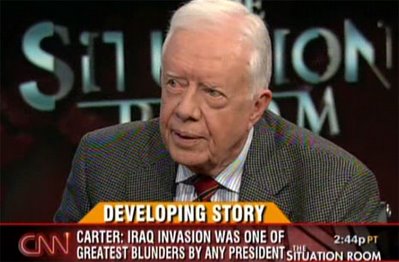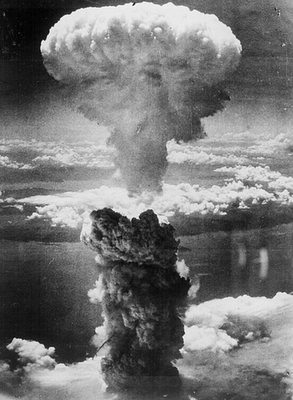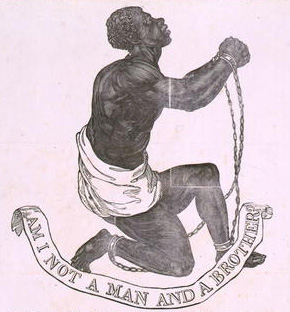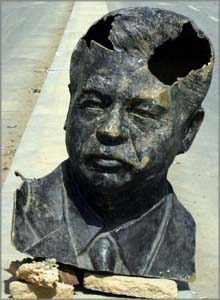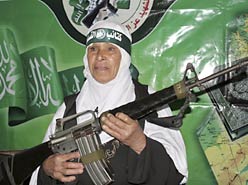Iraq is rending itself apart. The signs of collapse are everywhere. In Baghdad, the police often pick up more than 100 tortured and mutilated bodies in a single day. Government ministries make war on each other.
A new and ominous stage in the disintegration of the Iraqi state came earlier this month when police commandos from the Shia-controlled Interior Ministry kidnapped 150 people from the Sunni-run Higher Education Ministry in the heart of Baghdad.
Iraq may be getting close to what Americans call "the Saigon moment", the time when it becomes evident to all that the government is expiring. "They say that the killings and kidnappings are being carried out by men in police uniforms and with police vehicles," the Iraqi Foreign Minister Hoshyar Zebari said to me with a despairing laugh this summer. "But everybody in Baghdad knows that the killers and kidnappers are real policemen."
It is getting worse. The Iraqi army and police are not loyal to the state. If the US army decides to confront the Shia militias it could well find Shia military units from the Iraqi army cutting the main American supply route between Kuwait and Baghdad. One convoy was recently stopped at a supposedly fake police checkpoint near the Kuwait border and four American security men and an Austrian taken away.
The US and British position in Iraq is far more of a house built on sand than is realised in Washington or London, despite the disasters of the past three-and-a-half years. George Bush and Tony Blair show a unique inability to learn from their mistakes, largely because they do not want to admit having committed any errors in the first place.
Civil war is raging across central Iraq, home to a third of the country's 27 million people. As Shia and Sunni flee each other's neighbourhoods, Iraq is turning into a country of refugees.
The UN High Commissioner for Refugees says that 1.6 million are displaced within the country and a further 1.8 million have fled abroad. In Baghdad, neighbouring Sunni and Shia districts have started to fire mortars at each other. On the day Saddam Hussein was sentenced to death, I phoned a friend in a Sunni area of the capital to ask what he thought of the verdict. He answered impatiently that "I was woken up this morning by the explosion of a mortar bomb on the roof of my next-door neighbour's house. I am more worried about staying alive myself than what happens to Saddam."
Iraqi friends used to reassure me that there would be no civil war because so many Shia and Sunni were married to each other. These mixed couples are now being compelled to divorce by their families. "I love my husband but my family has forced me to divorce him because we are Shia and he is Sunni," said Hiba Sami, a mother, to a UN official. "My family say they [the husband's family] are insurgents ... and that living with him is an offence to God." Members of mixed marriages had set up an association to protect each other called the Union for Peace in Iraq but they were soon compelled to dissolve it when several founding members were murdered.
Everything in Iraq is dominated by what in Belfast we used to call "the politics of the last atrocity". All three Iraqi communities - Shia, Sunni and Kurds - see themselves as victims and seldom sympathise with the tragedies of others. Every day brings its gruesome discoveries.
Earlier this month, I visited Mosul, the capital of northern Iraq that has a population of 1.7 million people, of whom about two thirds are Sunni Arabs and one third Kurds. It is not the most dangerous city in Iraq but it is still a place drenched in violence.
A local tribal leader called Sayid Tewfiq from the nearby city of Tal Afar told me of a man from there who went to recover the tortured body of his 16-year-old son. The corpse was wired to explosives that blew up, killing the father so their two bodies were buried together.
Khasro Goran, the efficient and highly effective deputy governor of Mosul, said there was no civil war yet in Mosul but it could easily happen.
He added that 70,000 Kurds had already fled the city because of assassinations. It is extraordinary how, in Iraq, slaughter that would be front-page news anywhere else in the world soon seems to be part of normal life.
On the day I arrived in Mosul, the police had found 11 bodies in the city which would have been on the low side in Baghdad. I spoke to Duraid Mohammed Kashmula, the governor of Mosul, whose office is decorated with pictures of smiling fresh-faced young men who turned out to be his son and four nephews, all of them killed by insurgents.
His own house, together with his furniture, was burned to the ground two years ago. He added in passing that Mr Goran and he himself were the prime targets for assassination in Mosul, a point that was dramatically proved true the day after we spoke when insurgents exploded a bomb beside his convoy - fortunately he was not in it at the time - killing one and wounding several of his bodyguards.
For the moment Mosul is more strongly controlled by pro-government forces than most Iraqi cities. That is because the US has powerful local allies in the shape of the Kurds. The two army divisions in the province are primarily Kurdish, but the 17,000 police in Nineveh, the province of which Mosul is the capital, are almost entirely Sunni and their loyalty is dubious.
One was dismissed on the day of Saddam's trial for putting a picture of the former leader in the window of his car. In November 2004, the entire Mosul police force abandoned their police stations to the insurgents who captured £20m worth of arms.
"The terrorists do not control a single district in Mosul," is the proud claim of Major General Wathiq Mohammed Abdul Qadir al-Hamdani, the bullet-headed police chief of Nineveh. "I challenge them to fight me face to face." But the situation is still very fragile. We went to see the police operations room where an officer was bellowing into a microphone: "There is a suicide bomber in a car in the city. Do not let him get near you or any of our buildings." There was a reason to be frightened. On my way into Mosul, I had seen the broken concrete walls of the party headquarters of the Patriotic Union of Kurdistan, one of the two big Kurdish political parties. In August, two men in a car packed with explosives shot their way past the outer guard post and then blew themselves up, killing 17 soldiers.
The balance of forces in Nineveh between American, Arab, Kurd, Turkoman, Sunni and Shia is complicated even by Iraqi standards. Power is fragmented.
Sayid Tewfiq, the Shia tribal leader from Tal Afar, resplendent in his flowing robes, admitted: "I would not last 24 hours in Tal Afar without Coalition [US] support." "That's probably about right," confirmed Mr Goran, explaining that Sayid Tewfiq's Shia Turkoman tribe was surrounded by Sunni tribes. Earlier I had heard him confidently invite all of Nineveh provincial council to visit him in Tal Afar. Nobody looked enthusiastic about taking him up on the offer.
"He may have 3,000 fighters from his tribe but he can't visit most of Tal Afar himself," said another member of the council, Mohammed Suleiman, as he declined the invitation. A few hours before somebody tried to assassinate him, Governor Kashmula claimed to me that "security in Mosul is the best in Iraq outside the Kurdish provinces".
It is a measure of the violence in Iraq that it is an arguable point. Khasro Goran said: "The situation is not perfect but it is better than Anbar, Baquba and Diyala." I could vouch for this. In Iraq however bad things are there is always somewhere worse.
It is obviously very difficult for reporters to discover what is happening in Iraq's most violent provinces without being killed themselves. But, at the end of September, I travelled south along the Iraqi side of the border with Iran, sticking to Kurdish villages to try to reach Diyala, a mixed Sunni-Shia province north-east of Baghdad where there had been savage fighting. It is a road on which a wrong turning could be fatal.
We drove from Sulaimaniyah through the mountains, passed through the Derbandikhan tunnel and then took the road that runs beside the Diyala river, its valley a vivid streak of lush green in the dun-coloured semi desert.
The area is a smuggler's paradise. At night, trucks drive through without lights, their drivers using night-vision goggles. It is not clear what cargoes they are carrying - presumably weapons or drugs - and nobody has the temerity to ask.
We had been warned it was essential to turn left after the tumbledown Kurdish town of Kalar before reaching the mixed Arab-Kurdish village of Jalula. We crossed the river by a long and rickety bridge, parts of which had fallen into the swirling waters below, and soon arrived in the Kurdish stronghold of Khanaqin in Diyala province. If I had any thoughts about driving further towards Baghdad they were put to rest by the sight, in one corner of the yard of the local police headquarters, of the wreckage of a blue-and-white police vehicle torn apart by a bomb.
"Five policemen were killed in it when it was blown up at an intersection in As-Sadiyah two months ago," a policeman told me. "Only their commander survived but his legs were amputated."
Officials in Khanaqin had no doubt about what is happening in their province. Lt Col Ahmed Nuri Hassan, the exhausted-looking commander of the federal police, said: "There is a sectarian civil war here and it is getting worse every day." The head of the local council estimated 100 people were being killed a week.
In Baquba, the provincial capital, Sunni Arabs were driving out Shia and Kurds. The army and police were divided along sectarian lines. The one Iraqi army division in Diyala was predominantly Shia and only arrested Sunni. On the day after I left, Sunni and Kurdish police officers fought a gun battle in Jalula, the village I had been warned not to enter. The fighting started when Kurdish police refused to accept a new Sunni Arab police chief and his followers. Here, in miniature, in Diyala it was possible to see Iraq breaking up. The province is ruled by its death squads. The police say at least 9,000 people had been murdered. It is difficult to see how Sunni and Shia in the province can ever live together again.
In much of Iraq, we long ago slipped down the rapids leading from crisis to catastrophe though it is only in the past six months that these dire facts have begun to be accepted abroad. For the first three years of the war, Republicans in the US regularly claimed the liberal media was ignoring signs of peace and progress. Some right-wingers even set up websites devoted to spreading the news of American achievements in this ruined land.
I remember a team from a US network news channel staying in my hotel in Baghdad complaining to me, as they buckled on their body armour and helmets, that they had been once again told by their bosses in New York, themselves under pressure from the White House, to "go and find some good news and report it."
Times have changed in Washington. The extent of the disaster in Iraq is admitted by almost all, aside from President Bush. Even before the Democrats' victory in the Congressional elections on 7 November the magazine Vanity Fair commented acidly that "the only group in the Bush camp at this point are the people who wait patiently for news of the WMD and continue to believe that Saddam and Osama were once lovers."
Previous supporters of the war are showing embarrassing haste in recanting past convictions.
These days, it is in Britain alone, or more specifically in Downing Street, that policies bloodily discredited in Iraq in the years since the overthrow of Saddam Hussein still get a hearing. I returned from Mosul to London just in time to hear Tony Blair speaking at the Lord Mayor's banquet. It was a far more extraordinary performance that his audience appreciated.
As the Prime Minister spoke with his usual Hugh Grant charm, it became clear he had learned nothing and forgotten nothing in three-and-a-half years of war. Misconception after misconception poured from his lips.
Contrary to views of his own generals and every opinion poll assessing Iraqi opinion, he discounted the idea that armed resistance in Iraq is fueled by hostility to foreign occupation. Instead he sees dark forces rising in the east, dedicated, like Sauron in Lord of the Rings, to principles of pure evil. The enemy, in this case, is "based on a thoroughly warped misinterpretation of Islam, which is fanatical and deadly."
Even by the standard of Middle Eastern conspiracy theories, it was puerile stuff. Everywhere Mr Blair saw hidden hands - "forces outside Iraq that are trying to create mayhem" - at work.
An expert on the politics of Iraq and Lebanon recently said to me: "The most dangerous error in the Middle East today is to believe the Shia communities in Iraq and Lebanon are pawns of Iran." But that is exactly what the Prime Minister does believe.
The fact that the largest Shia militia in Iraq - the Mehdi Army of Muqtada al-Sadr - is anti-Iranian and Iraqi nationalist is conveniently ignored. Those misconceptions are important in terms of practical policy because they give support to the dangerous myth that if the US and Britain could only frighten or square the Iranians and Syrians then all would come right as their Shia cats-paws in Iraq and Lebanon would inevitably fall into line.
In a very British way, opponents of the war in Iraq have focused not on current events but on the past sins of the government in getting us into the war.
No doubt it was all very wrong for Downing Street to pretend that Saddam Hussein had WMD and was a threat to the world when they knew he was not. But this emphasis on the origins of the war in Iraq has diverted attention from the fact that, going by official statements, the British government knows no more about what was going on in Iraq in 2006 than it did in 2003.
The picture Mr Blair paints of Iraq seldom touches reality at any point. For instance, he says Iraqis "voted for an explicitly non-sectarian government," but every Iraqi knows the vote in two parliamentary elections in 2005 went wholly along sectarian and ethnic lines. The polls were the starting pistol for the start of the civil war.
Mr Blair steadfastly refuses to accept the fact that opposition to the American and British occupation of Iraq has been the main cause of the insurgency.
The commander of the British army, General Sir Richard Dannatt, was almost fired for his trouble when he made the obvious point that "we should get ourselves out some time soon because our presence exacerbates the security problem."
A series of opinion polls carried out by the US-based group WorldPublicOpinion.org at the end of September show why Gen. Dannatt is right and Mr Blair is wrong. The poll shows that 92 per cent of the Sunni and 62 per cent of the Shia - up from 41 per cent at the start of the year - approve of attacks on US-led forces. Only the Kurds support the occupation. Some 78 per cent of all Iraqis think the US military presence provokes more conflict than it prevents and 71 per cent want US-led forces out of Iraq within a year. The biggest and most menacing change this year is the growing hostility of Iraq's Shia to the American and British presence.
It used to be said that at least the foreign occupation prevented a civil war but, with 1,000 Iraqis being killed every week, it is now very clearly failing.
It was always true that in post-Saddam Iraq there was going to be friction between the Shia, Sunni and Kurds. But Iraqis were also forced to decide if they were for or against a foreign invader.
The Sunnis were always going to fight the occupation, the Kurds to welcome it and the Shia to co-operate for just so long as it served their interests. Patriotism and communal self-interest combined. Before 2003, a Sunni might see a Shia as the member of a different sect but once the war had started he started to see him as a traitor to his country.
Of course Messrs Bush and Blair argue there is no occupation. In June 2004, sovereignty was supposedly handed back to Iraq. "Let Freedom Reign," wrote Mr Bush. But the reality of power remained firmly with the US and Britain. The Iraqi prime minister Nouri al-Maliki said this month that he could not move a company of soldiers without seeking permission of the Coalition (the US and Britain). Officials in Mosul confirmed to me that they could not carry out a military operation without the agreement of US forces. There is a hidden history to the occupation of Iraq which helps explain why has proved such a disaster. In 1991, after the previous Gulf War, a crucial reason why President George HW Bush did not push on to Baghdad was that he feared the overthrow of Saddam Hussein would be followed by elections that would be won by Shia parties sympathetic to Iran. No worse outcome of the war could be imagined in Washington. After the capture of Baghdad in 2003, the US faced the same dilemma. Many of the contortions of US policy in Iraq since then have been a covert attempt to avoid or dilute the domination of Iraq's Shia majority.
For more than a year, the astute US envoy in Baghdad, Zalmay Khalilzad, tried to conciliate the Sunni. He failed. Attacks on US forces are on the increase. Dead and wounded US soldiers now total almost 1,000 a month..
An Iraqi government will only have real legitimacy and freedom to operate when US and British troops have withdrawn. Washington and London have to accept that if Iraq is to survive at all it will be as a loose federation run by a Shia-Kurdish alliance because together they are 80 per cent of the population. But, thanks to the miscalculations of Mr Bush and Mr Blair, the future of Iraq will be settled not by negotiations but on the battlefield.
The Occupation: War and Resistance in Iraq by Patrick Cockburn is published by Verso.
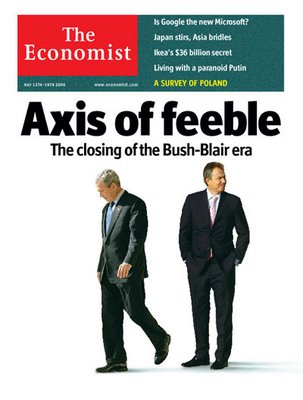 I posted an article by Patrick Cockburn the other day in which he spoke of the sheer level of disconnect between what Blair is saying and the reality on the ground in Iraq as experienced by people, like himself, who actually live there:
I posted an article by Patrick Cockburn the other day in which he spoke of the sheer level of disconnect between what Blair is saying and the reality on the ground in Iraq as experienced by people, like himself, who actually live there:
